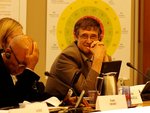André GUICHAOUA
contribution 25 -
GUICHAOUA, André

transtlated version
I would like to broaden the issue of Prosecution strategy or policy. From 2001 through to 2003 there were lists that had various names running up to 240 names of persons who could be prosecuted suspects. So my question is, today some persons at the height of those lists have decided not to give themselves up or they have decided to get themselves ^arrested but the momentum was such that they could not escape. In the light of the track record today, 70 per cent is prosecuted. My question is quite ^banal. Now, the 250 others, what happened to them? Those who were arrested, were those the easiest to be arrested because they could not hide?
Then I may add something else. In the final analysis, was the arrest strategy did it not go beyond the political criterion which had to do with informants, reporters. Let me site an example. In France or in Belgium or elsewhere we have a number of persons on that famous list, and everybody knows that in the Office of the Prosecutor there are ^weighted charges in those files, but now they have been abandoned. Why?
And I must admit that in the metro or on some streets I meet persons who tell me, "Well, that is the white man who informed the authorities on you." I’m sorry. That is my answer to the one who said the witnesses played a part. But those people, when they came, everyone knew that they had a heavy file.
I will not say more on that point since we made need to cite names. But recently in some ministry I was told, you don’t realise this, but can you believe it that in our country there are real criminals, persons who killed at a personal levels. Even the case files that were opened are the cases of persons who raised a lot of discussion because their cases are not very clear. I’m sorry, those who were following those cases are there.
Another question relates to the case of the famous presidential family. It is not confidential, but when one of the members was arrested, I remember, that same evening I called the minister of justice in Kigali. He said there was no file. There was no case file. And when I called Arusha, they said there was no file on it. And I believe that after two or three months, the person was left on standby so that a file could be opened against them.
So we had the same problem with the CRR file, the refugee appeals case. And it was said that if that body did its work properly, the other cases had been taken care of by the ICTR. So the CRR took its decision based on the work of the ICTR, while Arusha said it was the CRR that had all the facts.
Now, the Bagosora judgement states that the person concerned is not the brain behind it. So, if he is not the brain, in quotes, then he’s the architect or the delegated architect. So, there was someone who gave orders. Who is he and why was he not named?
So there are other members of the family who have been on the run for about 15 years. Somebody who is said to be the most wanted man in the world. I’m sorry in his physical state now, if he really wants to be caught, there should be no big problem. We could continue with lots of other files like this. In France recently there was a meeting with officials on the ^Democratique liberation for Rwanda, FDLR, who are on the list.
I just wanted to say these things. Now I’m reacting as an expert witness. The conclusion is that justice is justice, but justice it also producing an accused person. And that leads me to say in our profession that it is not a crime that makes a criminal. He has to be brought to book. He has to have a case opened and all that. It doesn’t mean that the others are not criminal. He becomes a criminal only when you begin a proceeding against him. That is what makes him a criminal.
So I would like to insist on these points of selections, these questions, which we ask ourselves unfailingly and which goes beyond the framework that was addressed a while ago.
Well, there is what any price a word, there are persons who are on the list. Now, we ask ourselves those who gave them up, they did not use the main criterion that they are now convicted persons.
J.P. GETTI
It is 5:25 p.m. We are drawing the close of this afternoon’s sessions. Professor Reyntjens, you need to talk.

